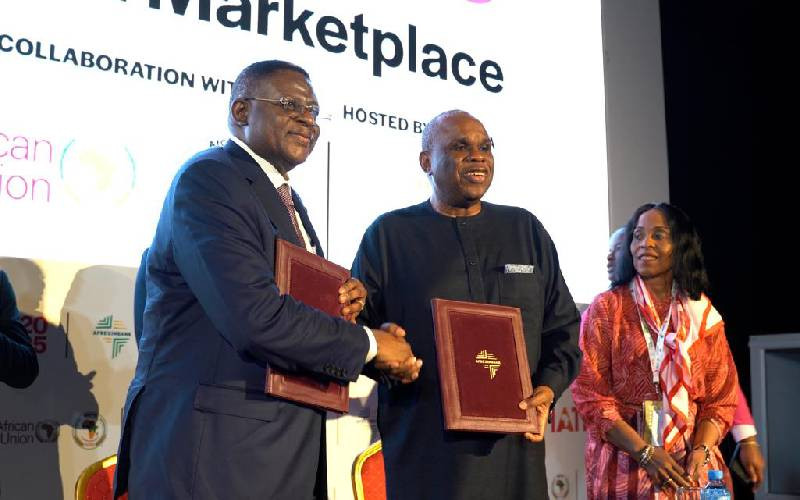The African Export-Import Bank, known as Afreximbank, will provide $2 billion in financing to sub-national governments such as counties, states, provinces, and municipalities to help drive economic development and trade, its president said on Friday.
The move is aimed at addressing regional inequality and boosting cross-border commerce under the African Continental Free Trade Area (AfCFTA), a landmark agreement to create a single market for goods and services across 54 African nations.
Afreximbank President Benedict Oramah announced the funding at the 5th African Sub-Sovereign Governments Network (AfSNET) conference, emphasising the critical role of local authorities in realizing the benefits of the AfCFTA.
“To ensure that we convert these opportunities into tangible economic gains for our States, we committed $2 billion to support AfSNET sub-sovereigns with trade and investment financing,” Oramah told delegates. “We have ensured that this support is flexible enough to meet diverse needs.”
Follow The Standard
channel
on WhatsApp
African Continental Free Trade Area (AfCFTA) Secretary-General Wamkele Mene endorsed the initiative, stressing that local authorities are crucial for implementing the trade pact.
He noted that these sub-sovereign governments are uniquely positioned to promote cross-border industrial clusters—geographic concentrations of interconnected businesses—and invest in trade-enabling infrastructure like roads, ports, and energy systems.
The funding commitment comes as many African nations grapple with stark regional inequalities. Countries like Kenya, which implemented a devolved system of government—granting significant autonomy to local authorities—in 2013, have struggled to ensure equitable development despite constitutional reforms.
Afreximbank’s financing has already supported several major projects, including industrial parks in Nigeria’s Ogun State, a deep seaport in Cross River State, Nigeria, and a $40 million pharmaceutical manufacturing facility in Kisumu, Kenya.
The Kenyan project, described as “Africa’s first blockchain-enabled, continuous manufacturing facility for essential medicines”—using distributed digital ledger technology for transparency—is expected to produce approximately two billion tablets and capsules annually.
Both leaders highlighted Algeria’s successful decentralisation efforts, noting the country has the lowest inequality index, as measured by the Gini coefficient—a statistical measure of income distribution—in Africa.
Mene outlined several priorities for making the AfCFTA work at local levels, including establishing continental transit guarantees and digital transformation tools like Afreximbank’s African Trade Gateway.
Oramah concluded with a call for coordinated action: “Africa’s transformation will be driven as much from the local level as from the national or continental levels. When sub-sovereigns are empowered, they become engines of prosperity.”
The next AfSNET conference will be hosted by Cross River State, Nigeria, in 2026.
Follow The Standard
channel
on WhatsApp
The African Export-Import Bank, known as Afreximbank, will provide $2 billion in financing to sub-national governments such as counties, states, provinces, and municipalities to help drive economic development and trade, its president said on Friday.
The move is aimed at addressing regional inequality and boosting cross-border commerce under the African Continental Free Trade Area (AfCFTA), a landmark agreement to create a single market for goods and services across 54 African nations.
Afreximbank President Benedict Oramah announced the funding at the 5th African Sub-Sovereign Governments Network (AfSNET) conference, emphasising the critical role of local authorities in realizing the benefits of the AfCFTA.
“To ensure that we convert these opportunities into tangible economic gains for our States, we committed $2 billion to support AfSNET sub-sovereigns with trade and investment financing,” Oramah told delegates. “We have ensured that
this support is flexible enough
to meet diverse needs.”
Follow The Standard
channel
on WhatsApp
African Continental Free Trade Area (AfCFTA) Secretary-General Wamkele Mene endorsed the initiative, stressing that local authorities are crucial for implementing the trade pact.
He noted that these sub-sovereign governments are uniquely positioned to promote cross-border industrial clusters—geographic concentrations of interconnected businesses—and invest in trade-enabling infrastructure like roads, ports, and energy systems.
The funding commitment comes as many African nations grapple with stark regional inequalities. Countries like Kenya, which implemented a devolved system of government—granting significant autonomy to local authorities—in 2013, have struggled to ensure equitable development despite constitutional reforms.
Afreximbank’s financing
has already supported several major projects, including industrial parks in Nigeria’s Ogun State, a deep seaport in Cross River State, Nigeria, and a $40 million pharmaceutical manufacturing facility in Kisumu, Kenya.
The Kenyan project, described as “Africa’s first blockchain-enabled, continuous manufacturing facility for essential medicines”—using distributed digital ledger technology for transparency—is expected to produce approximately two billion tablets and capsules annually.
Both leaders highlighted Algeria’s successful decentralisation efforts, noting the country has the lowest inequality index, as measured by the Gini coefficient—a statistical measure of income distribution—in Africa.
Mene outlined several priorities for making the AfCFTA work at local levels, including establishing continental transit guarantees and digital transformation tools like Afreximbank’s African Trade Gateway.
Oramah concluded with a call for coordinated action: “Africa’s transformation will be driven as much from the local level as from the national or continental levels. When sub-sovereigns are empowered, they become engines of prosperity.”
The next AfSNET conference will be hosted by Cross River State, Nigeria, in 2026.
Follow The Standard
channel
on WhatsApp
By Brian Ngugi


